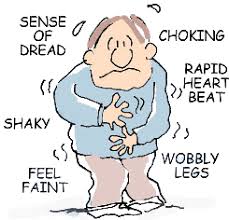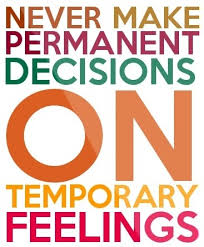The unthinkable has happened. The dreaded words have been uttered and you are now someone different than you were this morning. Tomorrow takes on a different meaning, if you can grapple with that word "meaning" after hearing that you are ill, quite seriously ill.
You've tried to take in the information you've just been handed, and even if you know something about that label, that diagnosis, you feel overwhelmed. It's technical, scientific, you can't process it all now. What's happening to you? How do you handle this situation?
What do I do?
And how do I decide what to do?
When this happened to me, I felt as though my brain had blown up to a size beyond what my skull could accommodate. My thoughts were irregular, scattered, rushing in a torrent. My blood pressure zoomed, my heart began to pound, and I felt icy cold from anxiety. My body warmth had gushed out of me like a spent balloon. If I had been in a brain imaging machine, my thoughts would have been darting about as if thousands of billiard balls had been hit at warp speed. Sheer chaos.
How was I going to handle this new situation? Every plan I had for the day, week, month, year, seemed like an illusion now. One thing I did know was that I would have to slow my body and its reactions down or else I would not be able to think clearly. From a brain functioning level, I would have to let it do its work in finding new ways of organizing the information it had just been exposed to. Calming down my body's panic responses would permit the restructuring of this information. My brain was actually shifting through dynamic patterns of activation and connectivity during this initial time.
From an evolutionary perspective, what was going on? When humans are faced with anxiety of this magnitude, they have to integrate appropriate ways of perceiving the information received and have their bodies respond to that information, along with the steady flow of sensory information of the environment in which they find themselves, all while keeping their biological needs met.

Imagine our ancestors hearing a predator's roar on the savannah. They would have to figure out what they were hearing, assessing the magnitude of the danger, and then have their bodies ready to respond appropriately to the level of the danger confronting them, while continuing to receive additional information from their environment. Only then could they figure out if the predator's call was far enough away that it did not require immediate flight. Imagine the complexity of what they had to accomplish in a short span of time in order to keep themselves free from danger. No wonder our body/minds have evolved into such accomplished and complicated entities.
My expectations as I entered the doctor's office were based on all of my previous visits. I had been assured that I did NOT have breast cancer. So that diagnosis came as a double shock to my system. The motives of my breast surgeon could not be faulted. This was an expert who only had my survival and best interests at heart. My previous experiences with illness informed me that I would certainly have the worst possible outcome. All of these were processed through my own personal, subjective perspective.
My body and thoughts were not prepared at all to receive the news of a cancer diagnosis. That's why I had severe bodily and emotional reactions to the diagnosis. I did not doubt the accuracy of the doctor's information, and thus I didn't think that she might be wrong. Some might seek out a second opinion because they have that feeling that another doctor might have a different, and better, determination of the situation. Finally, I had been raised to believe that my life would be filled with bad news and unceasing bad health. I didn't have the brave internal belief that I would most certainly triumph over this cancer.
The strength of my sensory experience and my memories played the major parts in how I reacted to a cancer diagnosis. In hindsight, it is understandable why I had the response that I did.
How can we maximize that initial encounter with a serious diagnosis so that we can relatively quickly, efficiently, and with the least anxiety, decide what our next steps should be?

First, our care providers should create as comfortable an environment for receipt of the diagnosis as possible. Familiar and inviting rooms rather than the usual clinical settings would be preferable for us. And for goodness sake, don't just send us out of your offices without a serene and embracing place in which to process the news! When my daughter had to put her beloved pet rat to sleep (yes, they can make lovely and loving pets), the veterinary hospital had a grief room with subdued lighting and literature about dealing with the grief of losing a pet. Couldn't our care providers figure out that we need the same secure processing space after hearing that our lives might be in danger? Couldn't there be videos or pamphlets on how to deal with the initial shock and dismay of a cancer diagnosis? Perhaps a private space where we could call our loved ones and tell them the news they so did not want to hear? Why did I have to blurt out this diagnosis to my husband in a public hallway?
Second, the least amount of uncertainty about our situation should be given to us up front. There used to be a philosophy in medical circles that it was kindest and most helpful to our survival if the doctor lied to us about the seriousness of our illness. I recall my Uncle Leo not being told he had terminal stomach cancer, even though all of us in the family knew. Now there is some belief that sugar-coating our diagnosis is in our best interest. "Oh, it's nothing much, a small malignancy..." came along with the belief that sunny thoughts and positive vibes gave us our best chances of survival. But we now know that there is NO correlation between a positive, sunny outlook and surviving cancer. That's why I did appreciate my doctor coming straight out when I took my seat in her office with my diagnosis. There wasn't much more I had to do to have my body and brain begin to align to this information, although it was still a horrible experience.
If there is, indeed, uncertainty involved, as I experienced with my lung cancer diagnosis, then neither my body nor my mind can immediately begin to integrate any rational strategy for problem-solving and decision-making. None of my oncologists or radiologists could tell me if the lung cancer was metastatic from my breast; or fatal small cell lung cancer; or some other type of lung cancer. I was faced with continuing billiard-ball random firings of brain connections, horrid memories of friends who had died of various types of cancers, and a complete collapse of rational thinking.
Third, we need to know what our goals are going to be going forward. We are a species that needs to make meaning out of our experiences. When it comes to any serious medical diagnosis, we need to make meaning of it immediately. That's where lack of uncertainty comes in. The less uncertainty, the sooner we can construct new goals and therefore create meaning for us in this new environment in which we find ourselves.
The first question I asked is probably the most common posed after a cancer diagnosis: "Am I going to die?"
Although no self-respecting doctor is going to answer unequivocally in the negative (unless it is a very mild diagnosis such as an early basal cell skin cancer or tiny ductal breast cancer), there are ranges of responses that indeed can quickly redirect our goals.
When I got my first breast cancer diagnosis, the oncologist told me that I had the type of cancer that 80% of women with breast cancer get, and their life expectancy was pretty good. Decades, perhaps. Then when they found cancer in my lymph node, the doctor told me this would be a chronic illness for me, with possible recurrences that could be fought. When the doctor thought my lung cancer was metastatic from my breast, she told me my expectancy was about 5 years. Hearing about some possible range of life span permitted me to produce new goals. Had I been told 5 years, then my goals would be radically different than they are now. I probably would have stopped all productive endeavors and just spend time with my grandson, daughter, husband, son-in-law, and dear friends. I would have done all the traveling I dreamed of in short order, and planted annual gardens.
But I have the luxury, 3 years out from treatment, in hoping and believing that I have more than 5 years left. So I set different goals, such as writing the book about to be published, continuing the blog I write, the volunteer programs I am part of, and planning next year's trip. If my medical situation changes, so will my goals.
But I have the luxury, 3 years out from treatment, in hoping and believing that I have more than 5 years left. So I set different goals, such as writing the book about to be published, continuing the blog I write, the volunteer programs I am part of, and planning next year's trip. If my medical situation changes, so will my goals.
These new goals have given my life new meaning. The goals and my cancers were not included in my dream goals pre-cancer diagnosis, but at least it has helped me thread my way through the questions of "what do I do now, and how do I decide."
No comments:
Post a Comment